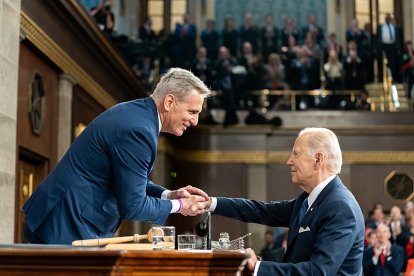With more Democrats than Republicans voting in favor, the debt ceiling deal was approved by the House of Representatives
After extensive debate, McCarthy and Jeffries secured the votes needed to send the legislation to the Senate, where it is expected to face some resistance from both parties.

McCarthy-Biden/W
The House of Representatives approved the debt ceiling deal between Joe Biden and Kevin McCarthy. After days of controversy and internal disputes in both parties, the House approved the text with 314 votes in favor and 117 votes against. Now the problematic text will be passed to the Senate, where the parties are also expected to clash.
Since the announcement of the deal, leadership went out of its way to explain why it was necessary to vote in favor, recognizing that while the outcome was not perfect, it would help straighten out federal government spending—after a problematic first vote that took place in the afternoon, the moment of truth arrived. It took nearly two hours for the debate to end and the vote to begin, which ended with more Democrats than Republicans supporting the legislation.
The final numbers were as follows: 165 Democrats and 149 Republicans voted in favor of the bill, while 71 Republicans and 46 Democrats opposed it. In addition, there were two abstentions per side.
The debate before the vote lasted almost two hours and was attended by the leadership of both parties. First to speak was Hakeem Jeffries (Minority Leader), who boasted that Democrats would save the legislation hours earlier when they joined Republicans in advancing the bill to a final vote.
“Extreme MAGA Republicans attempted to take control of the House floor. Democrats took it back for the American people,” he began, asserting that had this group succeeded, they “would have undermined the health, the safety and the economic well-being of everyday Americans.”
Minutes later, it was McCarthy’s turn. He first thanked Congressmen Patrick McHenry and Garrett Graves, his chief negotiators with the White House. “Tonight we are going to do something we haven’t done before. Tonight we’re going to give America hope. Tonight, we’re going to vote for the largest savings in American history,” he said.
At the same time, he assured that overspending is not an economic problem, but a moral one. To exemplify his point, he showed a photo of little Halle, a baby girl born in mid-April. He then held up a sign with the figure of $95,000, Halle’s share of the national debt. “Not a very good gift for a newborn,” he continued.
Finally, he stuck to the script that the leadership has been repeating about the agreement: it’s not perfect, but it sets the course straight on spending. “I’ll be honest, tonight’s bill doesn’t stop it, but for the first time we begin to turn the ship,” he closed, emulating the words of Newt Gingrich from the beginning of the week.
After the vote, the House passed the issue to the Senate, where several members have already expressed that their votes will not be positive. So far, Ted Cruz, Rand Paul, Mike Lee, Tim Scott and others have come out against it, as did Bernie Sanders.
“The best that could be said about the current debt ceiling deal is that it could have been much worse. Having said that, I cannot vote for this bill,” the progressive senator wrote on his Twitter account.
However, Mitch McConnell was confident about the chances of passing the legislation in the Upper House. “I can tell you that what I hope will happen is that those who have amendments, if they get votes, will turn back the clock so that we can finish this Thursday or Friday and calm the country and calm the markets,” he told reporters Wednesday afternoon.












